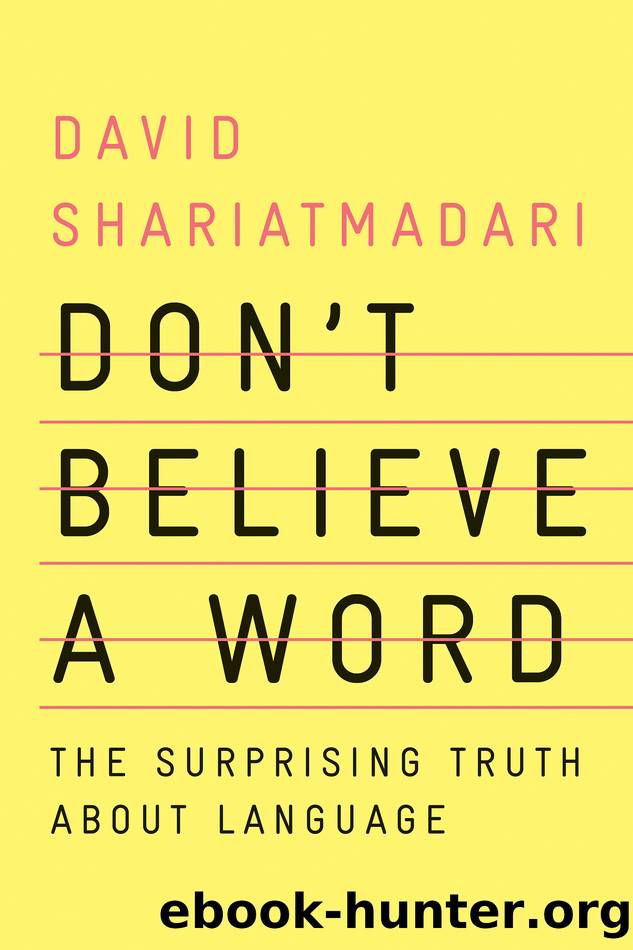Don't Believe a Word by David Shariatmadari

Author:David Shariatmadari
Language: eng
Format: epub
Publisher: W. W. Norton & Company
Published: 2019-09-13T00:00:00+00:00
Military matters
So far, weâve got along without defining the difference between a language and a dialect. There are good reasons for that: itâs often not very clear. Piedmontese, for example, is generally considered a dialect of Italian. But the philologist Auguste Brun described it instead as a language that âdid not succeed.â It would be quite reasonable to regard it as a separate entity: it differs from standard Italian in its vocabulary and grammar, and has a long literary tradition. But when Italy was unified in the nineteenth century, a version of Tuscan was adopted as its official language, and the status of Piedmontese was relegated forever to that of dialect. Clearly, that was a political decision. So does the difference between a dialect and a language always come down to politics?
Very often it does. English and Mandarin, say, are obviously completely different. There is no common ground between them save borrowed words,* they evolved in entirely separate parts of the world, and for centuries contact between the two civilizations that used them was limited. But in a situation where the âlanguagesâ share a common ancestor and are spoken in close proximity, precisely where you draw the dividing line frequently comes down to power. As one Yiddish-speaking audience member at a lecture by the sociolinguist Max Weinreich famously said (the quote is often attributed to Weinreich himself), âa shprakh iz a dialekt mit an armey un flotââa language is a dialect with an army and navy. That wisdom largely holds true. The differences between Norwegian, Danish and Swedish are much smaller than the differences between many of the dialects lumped together as âChinese.â And yet the former are said to be languages, since they belong to three separate nations for whom the differentiationâparticularly for the historically poorer, less powerful Norwayâis highly significant. Spoken Urdu and Hindi can be indistinguishable from one another, but their status as distinct languages is a point of pride for two nations which have often been on the verge of war.
Arabic offers a mirror image of this. Morocco and Iraq both have an army and navy, and their citizens would have trouble understanding each other in everyday conversation. But they are said to speak dialects of Arabic rather than separate languages. That seems strange until you remember that the religious ties binding the Arab world together are strong. The Quran represents an early standardization of the language, an unchanging model that is revered everywhere Islam is practiced.â Modern standard Arabic, the language of news bulletins and government business, is closely related to that model, and operates as a vehicle for the common Arab identity. But since the geographical range of Arabic is so large, and ordinary people donât speak like newsreaders, there exists a two-tier linguistic landscape in many Arab countriesâsomething that has been called diglossia, from the Greek for âtwoâ and âtongue.â Modern standard Arabic hovers somewhere above the local varieties, ultimately yoking them all together.â¡
This yoking, whether for political or cultural reasons, has been
Download
This site does not store any files on its server. We only index and link to content provided by other sites. Please contact the content providers to delete copyright contents if any and email us, we'll remove relevant links or contents immediately.
Cecilia; Or, Memoirs of an Heiress — Volume 1 by Fanny Burney(32536)
Cecilia; Or, Memoirs of an Heiress — Volume 2 by Fanny Burney(31933)
Cecilia; Or, Memoirs of an Heiress — Volume 3 by Fanny Burney(31925)
The Lost Art of Listening by Michael P. Nichols(7485)
Asking the Right Questions: A Guide to Critical Thinking by M. Neil Browne & Stuart M. Keeley(5751)
We Need to Talk by Celeste Headlee(5604)
On Writing A Memoir of the Craft by Stephen King(4924)
Dialogue by Robert McKee(4385)
Pre-Suasion: A Revolutionary Way to Influence and Persuade by Robert Cialdini(4208)
I Have Something to Say: Mastering the Art of Public Speaking in an Age of Disconnection by John Bowe(3871)
Elements of Style 2017 by Richard De A'Morelli(3336)
The Book of Human Emotions by Tiffany Watt Smith(3289)
Fluent Forever: How to Learn Any Language Fast and Never Forget It by Gabriel Wyner(3071)
Name Book, The: Over 10,000 Names--Their Meanings, Origins, and Spiritual Significance by Astoria Dorothy(2967)
Why I Write by George Orwell(2944)
Good Humor, Bad Taste: A Sociology of the Joke by Kuipers Giselinde(2939)
The Art Of Deception by Kevin Mitnick(2785)
The Grammaring Guide to English Grammar with Exercises by Péter Simon(2733)
Ancient Worlds by Michael Scott(2672)
